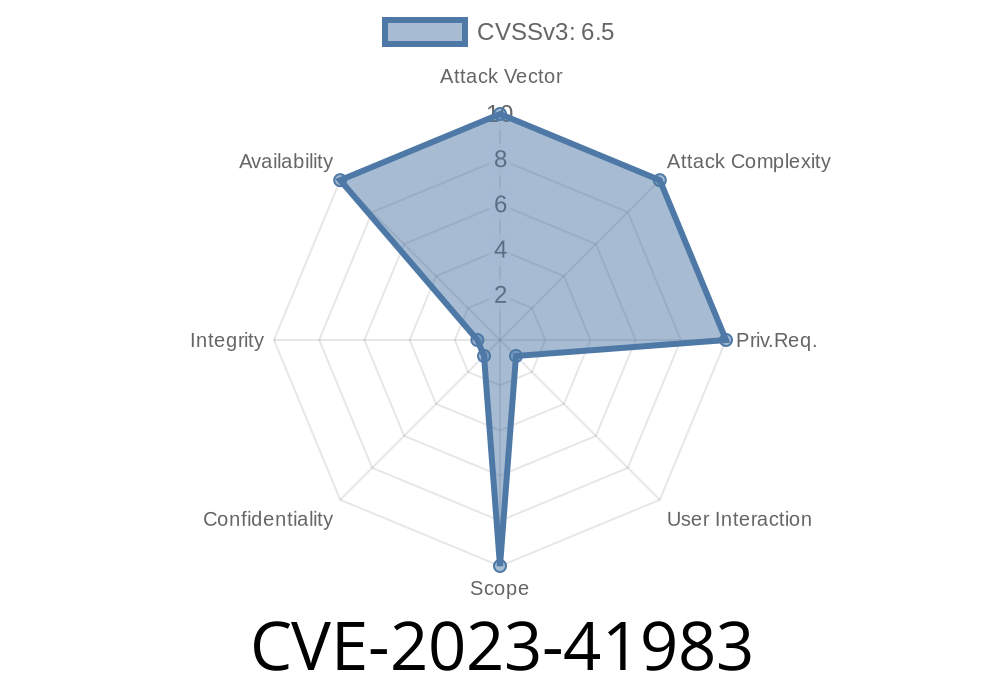In October 2023, Apple quietly fixed a significant vulnerability that could cause Safari and other Apple devices to crash when processing certain web content. This vulnerability, tracked as CVE-2023-41983, boiled down to a memory handling bug. In this long-read, we’ll break down what happened, how it could be exploited, give a sample code snippet, and show you how Apple ultimately squashed the bug.
What Is CVE-2023-41983?
CVE-2023-41983 is a vulnerability discovered in Apple software, specifically impacting macOS (through Safari), iOS, and iPadOS. The bug allowed malicious web content to trigger a denial-of-service (DoS) attack—that is, simply by visiting a webpage, your browser or device could freeze or crash.
While this issue didn’t lead to device compromise or data theft, a reliable crash can be highly disruptive—imagine your phone rebooting just because you clicked a link.
Official Advisory
> Processing web content may lead to a denial-of-service. The issue was addressed with improved memory handling.
> — Apple Security Updates
> (apple.com support page)
What’s the Technical Root Cause?
At its heart, CVE-2023-41983 is a memory management issue in Apple’s WebKit engine (the power behind Safari). Often, these bugs are about how the browser handles memory when working with complex HTML, CSS, and JavaScript code from the web.
In this case, a specially crafted web page could cause the browser to allocate memory in a way it can’t handle—leading to a crash or hang. While Apple didn’t release technical specifics, based on their fix notes (“improved memory handling”), it’s likely a use-after-free, buffer overflow, or out-of-bounds access scenario.
How Could Someone Exploit This Bug?
Scenario: An attacker creates a website with tricky code—maybe some oversized strings, thousands of HTML objects, or complicated CSS animations. When you visit, Safari (or another Apple browser using WebKit) just can’t keep up and crashes.
Sending the malicious link via social media, email, or text
What does a do-it-yourself example look like? Here’s a simple proof-of-concept (for education ONLY!):
## Code Snippet: Triggering a DoS in WebKit/Safari
The actual bug Apple fixed is deeply buried in native code, but here’s a JavaScript HTML snippet that could "poke the bear" in buggy browsers:
<!-- WARNING: Older, unsafe versions may crash! -->
<!DOCTYPE html>
<html>
<body>
<script>
for(let i = ; i < 100000; i++) {
document.body.appendChild(document.createElement('iframe'));
}
</script>
<h1>If your browser is vulnerable, it might freeze or crash now</h1>
</body>
</html>
This simple script creates a huge number of iframes. While not the exact attack used in CVE-2023-41983, techniques like this have historically stressed browser memory handling and caused crashes, especially in unpatched versions.
Timeline & Patch
Reported: Sometime before October 2023
Patched:
Limiting how much memory certain web code can request
- Fixing the code that caused out-of-bounds writes/reads
References and Further Reading
- Apple Security Updates (October 2023)
- CVE Record on NVD
- WebKit Security Bug Tracker
Conclusion
While CVE-2023-41983 never allowed hackers to take over Apple devices, it was a real annoyance and could have been used for targeted disruption. The silver lining: Apple addressed it quickly in all major products. Want to stay safe? Keep your Apple devices updated. That iOS or Safari security update you keep ignoring might just save you from headaches like this!
Remember: Tech changes fast. Stay smarter and safer by reading up on the bugs you *don’t* see until it’s too late.
Timeline
Published on: 10/25/2023 19:15:10 UTC
Last modified on: 11/17/2023 13:15:08 UTC
